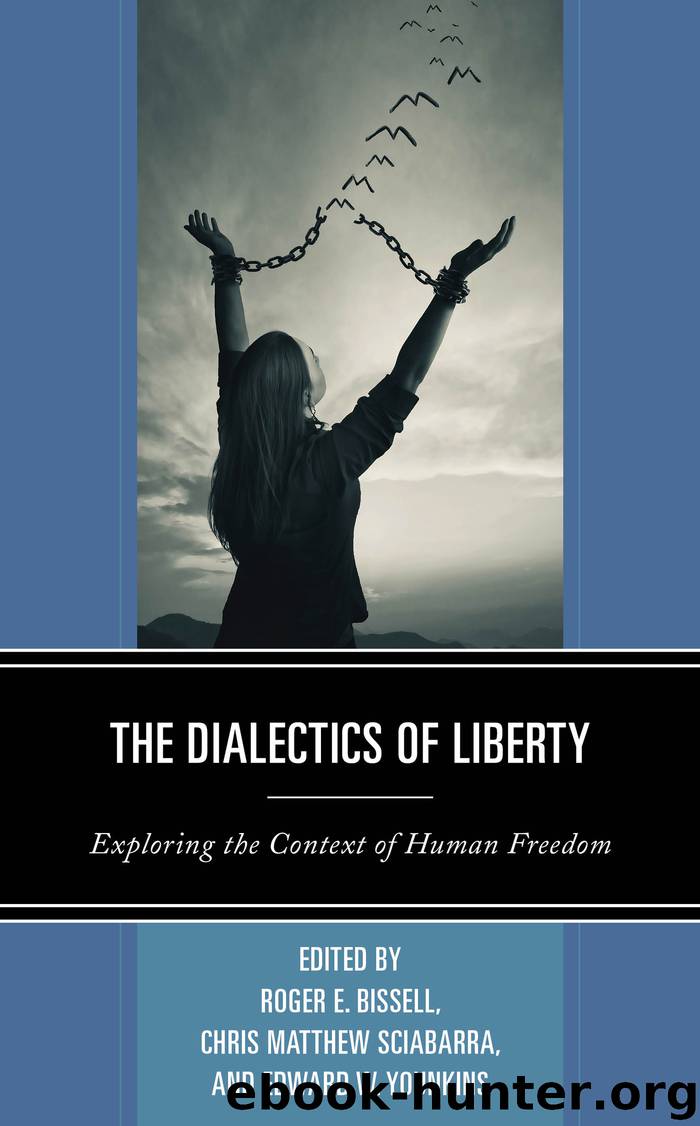The Dialectics of Liberty by Bissell Roger E.;Sciabarra Chris Matthew;Younkins Edward W.;

Author:Bissell, Roger E.;Sciabarra, Chris Matthew;Younkins, Edward W.;
Language: eng
Format: epub
Tags: undefined
Publisher: Rowman & Littlefield Publishing
Published: 2012-02-26T16:00:00+00:00
How Culture Changed the Economy:
Female Labor Force Participation
in the Twentieth Century
The cultural changes that accompanied the changes in the economic foundations of marriage and family in the late nineteenth century were important causes of significant further economic change in the twentieth century. In this section, I want to explore this half of the culture/economy dialectic with respect to marriage and family by looking at the ways in which the new cultural model of marriage and family changed women’s role in the economy, and some of the larger economic and social consequences thereof. As suggested at the end of the last section, the love-based marriage led to an increase in the economic, political, and cultural equality of women. In addition, the gains in wealth from the higher wages of industrialization allowed for children to gain additional years of education, including girls. Although these changes did not affect the wives and mothers who were gaining equality, it did matter for the next generation of women who came to adulthood with more and better human capital, which better prepared them for the job market. The increased social equality of women and the increased human capital of successive generations of young women transformed the role of women in the labor market and the U.S. economy in the process.
One key aspect of this story is the eventual reduction in the cultural stigma for men whose wives worked outside of the home. As wages rose and women and children no longer needed to contribute to the family income, and as men and women were seen as responsible for the public and private sphere respectively, being able to support a family on the father’s income alone was seen as a sign of middle-class comfort. By the early twentieth century, men whose wives worked outside the home were assumed to be unable to support their families themselves and were therefore held in relatively low social regard. Even if the reasons for their wives working had nothing to do with the man’s earning capacity, many of these men would have preferred not to face the stigma associated with a working wife.
As the economic historian Claudia Goldin (2006) argues in her overview of female labor force participation patterns in the twentieth century, this cultural stigma played an important role in understanding the labor market decisions of married women. In the early twentieth century, when that stigma was significant, women’s labor force decisions were very responsive to changes in the incomes of their husbands. As the income of the rest of the household increased, women were very quick to exit the labor force, and they would re-enter only if their husband’s income dropped significantly. The influence of the wage they could get for their own labor was not nearly as important as the wage of their husband, given the stigma associated with a working wife. In these early years, even though women were able to command somewhat higher wages because the demand for female labor was starting to grow a bit
Download
This site does not store any files on its server. We only index and link to content provided by other sites. Please contact the content providers to delete copyright contents if any and email us, we'll remove relevant links or contents immediately.
The Secret History by Donna Tartt(19053)
The Social Justice Warrior Handbook by Lisa De Pasquale(12187)
Thirteen Reasons Why by Jay Asher(8893)
This Is How You Lose Her by Junot Diaz(6877)
Weapons of Math Destruction by Cathy O'Neil(6265)
Zero to One by Peter Thiel(5787)
Beartown by Fredrik Backman(5737)
The Myth of the Strong Leader by Archie Brown(5500)
The Fire Next Time by James Baldwin(5431)
How Democracies Die by Steven Levitsky & Daniel Ziblatt(5215)
Promise Me, Dad by Joe Biden(5141)
Stone's Rules by Roger Stone(5081)
A Higher Loyalty: Truth, Lies, and Leadership by James Comey(4954)
100 Deadly Skills by Clint Emerson(4921)
Rise and Kill First by Ronen Bergman(4780)
Secrecy World by Jake Bernstein(4741)
The David Icke Guide to the Global Conspiracy (and how to end it) by David Icke(4709)
The Farm by Tom Rob Smith(4502)
The Doomsday Machine by Daniel Ellsberg(4484)
